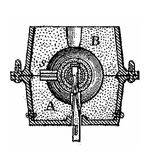
A “Cleansing of the Altar” Is Long Overdue
COUNTERING INCREASING IRREVERENCE & DISRESPECT
The sacred territory of the Catholic altar, at which the Lord Himself is consecrated and the tabernacle holding the Lord is expected to repose, commands respect at all times, most especially during the Holy Sacrifice of the Mass. Although the sacred character of the altar has not changed since the implementation of the Novus Ordo Missae after the Second Vatican Council, the reverence given, by some, to that altar has increasingly diminished.
For anyone with an ambiguous understanding or ignorance of the altar’s sacredness, or who has a proclivity for disrespect or a lack of boundaries, there was, prior to the so-called spirit of Vatican II, both a social climate and a protective perimeter that enforced the altar’s sacredness. The social climate dictated to all persons, even those not serious about the faith and those not of the faith, that the high altar was due reverence and respect. Many altars were constructed with a sacred offertory altar bridge at which the properly disposed faithful would kneel for reception of Holy Communion. The offertory altar bridge provided a visual and physical attestation to the separateness of the high altar.
A recent incident illustrates how disrespect of the altar, even during the Mass, is so frequent that many Catholics today are no longer surprised at, or even recognize, significant affronts.
At a Novus Ordo Sunday Mass in New York City, a local politician running for re-election in what was expected to be a competitive primary and then a very competitive general election was invited to give a speech during the Holy Sacrifice of the Mass, at the altar, and from the ambo. In order to mask any overtly political overtones, the politician’s speech focused on his upbringing and early life and on the type of “work” he does in the electoral district. As the politician spoke in English from the microphoned ambo, his translator and legislative aide stood below, without a microphone, translating his speech into Spanish by yelling in a loud voice.
You May Also Enjoy
The Church seems to choose to appear as in decline artistically, liturgically, and inspirationally.
Everything in the old Requiem Mass forced us to consider death and God’s judgment, Christ’s mercy and our complacency.
When the Church stripped the liturgy of its grandeur, she cheapened the meaning of priesthood and is now reaping a predictably poor harvest.

